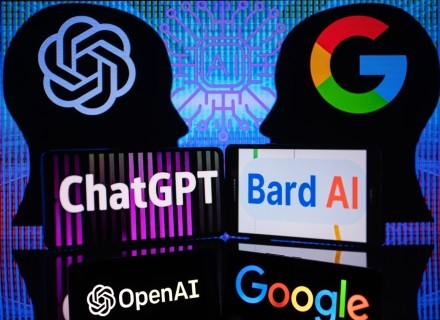After Microsoft-backed artificial intelligence chatbot ChatGPT became a tremendous hit, Google has now come up with Bard, its own version of the artificial intelligence chatting tool.
The company is also putting Bard’s technology into Google’s search engine to make it easier to find answers to complicated questions.
Bard has been made available to specialised product testers in the first week of February 2023, and in the coming days, it will be made available to everyone. Like ChatGPT, Bard is run by a “large language model,” in this case, LaMDA from Google.
LaMDA and ChatGPT are significant language artificial intelligence models that use neural networks and computer programmes to simulate the human brain’s internal structure. By giving them a lot of text from the internet, these chatbots are trained on how to write answers to text-based questions.
Following its release in November 2022, ChatGPT has gained popularity for producing a wide range of legitimate content, including academic essays, poems, and job applications. Analysts estimate that there are already 100 million users. It also cleared the Minnesota University Law School exam in January 2023, along with the Wharton MBA exam, and the US law and medical licensing tests.
Google CEO Sundar Pichai has been vocal about Bard being as good as ChatGPT. Google’s information release on the chatbot included an example of Bard responding to a question about how to teach a nine-year-old about recent discoveries made by NASA’s James Webb space telescope and learning about the current top football strikers and receiving training routines to imitate elite players.
Sundar Pichai stated, “Bard seeks to combine the depth of the world’s knowledge with the strength, intelligence, and creativity of our large language models. It also uses data from the internet to deliver original, excellent responses.”
Google also said its search engine would incorporate the newest artificial intelligence technologies, including LaMDA, PaLM, the picture generator Imagen, and the music maker MusicLM.
Sundar Pichai also said that new artificial intelligence-powered search engine features would make complex data and different points of view easier to understand.
He gave the example of asking Google, “Which instrument is easier to learn, a guitar or a piano?”
Instead of providing a link to a single blog post, Google gave an example of a conversational answer to the question.
It reads, “Some claim the piano is easier to master, as the finger and hand movements are more natural, and learning and memorising notes can be more accessible.”
Others argue that learning guitar chords is more straightforward and that one may quickly master a strumming pattern.
To create apps utilising Google’s artificial intelligence technology, the company will also make the LaMDA technology available to developers, creators, and enterprises.
When a Google employee made public assertions that LaMDA was “sentient” in 2022, it quickly became a topic of discussion over the potential power of artificial intelligence. So, Google fired Blake Lemoine because they thought his claims about LaMDA, which stands for “language model for dialogue applications,” were “wholly unfounded.”
Google made its statement as Microsoft, a major supporter of ChatGPT, prepared to release other products utilising the chatbot’s technology. OpenAI, a San Francisco-based company that has secured a massive investment from Microsoft, created ChatGPT.
Users of Microsoft’s Bing search engine claimed to have seen a preview of a feature over the weekend that allowed them to ask queries up to 1,000 characters long with source citations in the answers.
In response to Google’s move, Microsoft is now revamping its Bing search engine and Edge web browser with artificial intelligence, in one of its biggest efforts to lead a new wave of technology and reshape how people gather information.
Microsoft is staking its future on artificial intelligence through billions of dollars of investment, while it challenges Google.
This rivalry may result in new competition in the field of cloud computing and collaboration products in 2023.
Working with OpenAI, Microsoft is now aiming to leapfrog Google and claim control over vast returns from tools that speed up content creation, automating tasks, if not jobs themselves.
“This technology is going to reshape pretty much every software category,” Microsoft Chief Executive Satya Nadella told reporters at company headquarters in Washington.
Investors are also expecting the artificial intelligence battle to create new markets. Shares of Microsoft rose 3.8% and Alphabet, Google’s parent, gained by 3.6%.
Microsoft’s new Bing search engine is live in a limited preview on desktop computers and will be available for mobile devices in the coming weeks.
Bing will be powered by artificial intelligence and run on a new “large language model” that is more powerful than ChatGPT, said Microsoft Consumer Chief Marketing Officer Yusuf Mehdi. Bing is currently far behind Google in search market share.
Microsoft is now aiming to market OpenAI’s technology to its cloud customers and add the same power to its suite of products, including search.
Near-term, “the partnership with OpenAI is more relevant for its business customers,” said Gartner analyst Jason Wong, while interacting with AlJazeera. He, however, also said that it could offer “disruptive opportunities” in consumer businesses as well.
“Except for gaming, Microsoft has not been a leader in key consumer technologies, such as search, mobile and social media,” he added.
The rivalry in the field of search engines is now among the industry’s biggest, as OpenAI sets up Microsoft to expand its 9% share at Google’s expense, said Daniel Ives, an analyst with Wedbush Securities.

